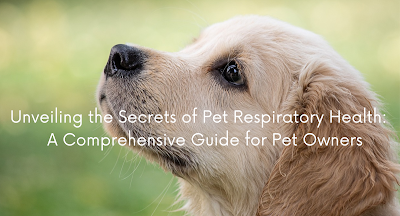Unveiling the Secrets of Pet Respiratory Health: A Comprehensive Guide for Pet Owners
Introduction
Welcoming a furry friend into your home is a joyous
occasion, but as responsible pet owners, it's crucial to be aware of potential
health challenges, particularly those related to respiratory well-being. In
this comprehensive guide, we'll explore various aspects of canine respiratory
health, from identifying early signs of distress to implementing holistic
approaches for a thriving four-legged companion.
Decoding Respiratory Illness in
Dogs:
What Every Pet Owner Should
KnowUnderstanding respiratory issues in dogs is the first step toward ensuring
their well-being. While coughing and nasal discharge are common signs, pet
owners should also be vigilant about subtler indications like changes in
breathing patterns and persistent fatigue. These symptoms might point to
respiratory distress, necessitating prompt attention.
To
delve deeper, it's essential to recognize the diverse range of respiratory
illnesses that can affect dogs. Conditions such as kennel cough, pneumonia, and
bronchitis are among the commonly encountered respiratory problems. Knowing the
specific symptoms and triggers for these ailments empowers pet owners to take
timely action.
A Breath of Fresh Air: Proactive Steps to Ensure Canine Respiratory
Wellness
Beyond
reacting to respiratory issues, proactive measures play a pivotal role in
maintaining your dog's respiratory health. Start with considering the air
quality in your home. A well-ventilated space with minimal exposure to
pollutants significantly contributes to your pet's overall well-being.
Regular
exercise is another key factor. Designing an exercise routine that suits your
dog's breed and age not only promotes cardiovascular health but also enhances
respiratory function. Engaging in outdoor activities allows your dog to breathe
in fresh air, promoting healthy lung capacity.
Red Flags: Recognizing Early Signs of Respiratory Distress in Dogs
Early
detection is crucial in mitigating the impact of respiratory distress on your
dog's health. Watch for subtle red flags, such as increased respiratory rate,
persistent coughing, or nasal discharge. Additionally, observe for changes in
appetite and energy levels, as these can be indicative of underlying
respiratory issues.
Recognizing
these signs doesn't replace professional veterinary care, but it does empower
pet owners to seek timely intervention. Regularly monitoring your dog's
behavior and noting any deviations from their usual patterns can make a
significant difference in catching potential problems early on.
Breeds in the Spotlight: Identifying Respiratory Vulnerabilities
Certain
dog breeds are genetically predisposed to respiratory challenges.
Brachycephalic breeds, such as Bulldogs and Pugs, often face respiratory
difficulties due to their unique facial structures. Understanding the specific
vulnerabilities of your dog's breed allows for targeted care and preventive
measures.
Owners
of at-risk breeds should be particularly cautious during extreme weather
conditions, as both hot and cold temperatures can exacerbate respiratory
issues. Ensuring that your pet has a comfortable and well-ventilated space
during such periods can help mitigate potential challenges.
Vet Wisdom: Expert Tips for Maintaining Optimal Respiratory Health
Veterinarians
are invaluable allies in ensuring your dog's respiratory well-being. Schedule
regular check-ups and consult your vet for personalized advice on vaccinations,
dietary needs, and lifestyle adjustments. Vaccinations, in particular, play a
crucial role in preventing respiratory infections that can be life-threatening.
Expert
guidance also extends to managing chronic respiratory conditions. Veterinarians
can recommend medications, inhalers, or other treatments to alleviate symptoms
and enhance your dog's overall quality of life. Establishing a strong
partnership with your vet is key to proactive respiratory care.
A Holistic Approach: Natural Remedies for Respiratory Well-Being
Incorporating
holistic approaches into your dog's care regimen can complement traditional
veterinary interventions. Natural remedies, such as herbal supplements and
aromatherapy, have shown promise in supporting respiratory health.
Consider
introducing Omega-3 fatty acids into your dog's diet, as these can have
anti-inflammatory effects on the respiratory system. However, it's crucial to
consult your vet before making any significant changes to your pet's diet or
introducing new supplements.
Triumph over Challenges: Inspiring Stories of Canine Respiratory Recovery
Real-life
stories of dogs overcoming respiratory challenges offer hope and inspiration to
pet owners facing similar situations. These narratives not only highlight the
resilience of pets but also underscore the importance of dedication and collaboration
between owners and veterinarians.
Sharing
experiences within the pet owner community fosters a sense of support and
understanding. Knowing that others have faced and conquered similar challenges
can provide comfort and motivation during difficult times.
Tomorrow's Wellness: Innovations Shaping Canine Respiratory Care
The
landscape of pet healthcare is continually evolving, with ongoing research and
innovations promising a brighter future for canine respiratory health. Stay
informed about developments in diagnostics, treatments, and preventive measures
that may revolutionize how we care for our furry companions.
Outdoor Adventures for Respiratory Fitness
Encouraging
outdoor activities not only promotes physical fitness but also contributes to
robust respiratory health. Regular walks, playtime, and exposure to natural
environments stimulate deep breathing, enhancing lung capacity.
Balanced Diet for Respiratory Strength
Diet
plays a crucial role in overall health, including respiratory well-being. Ensure
your dog's diet is rich in nutrients that support lung function. Omega-3 fatty
acids, found in fish oil, have anti-inflammatory properties and can positively
impact respiratory health.
Mindful Grooming Practices
Regular
grooming is not just about aesthetics; it's also a key aspect of respiratory
health. Keeping your dog's coat clean reduces the risk of allergens and
pollutants accumulating, minimizing the potential for respiratory irritation.
Environmental Enrichment for Mental and Respiratory Well-Being
An
enriched environment benefits both mental and respiratory health. Interactive
toys, puzzles, and engaging activities stimulate your dog's mind while
encouraging deep, satisfying breaths, promoting overall respiratory fitness.
Regular Check-ups: The Cornerstone of Respiratory Care
Emphasize
the importance of routine veterinary check-ups in the conclusion. Regular
assessments allow for early detection of potential respiratory issues,
facilitating timely intervention and improved long-term outcomes.
Conclusion: A Holistic Approach to Ensure Your Pet's Respiratory Bliss
Summarize
the key insights from each section, highlighting the significance of a holistic
approach, early detection, and proactive care in ensuring the respiratory
well-being of your beloved pets.






0 Comments